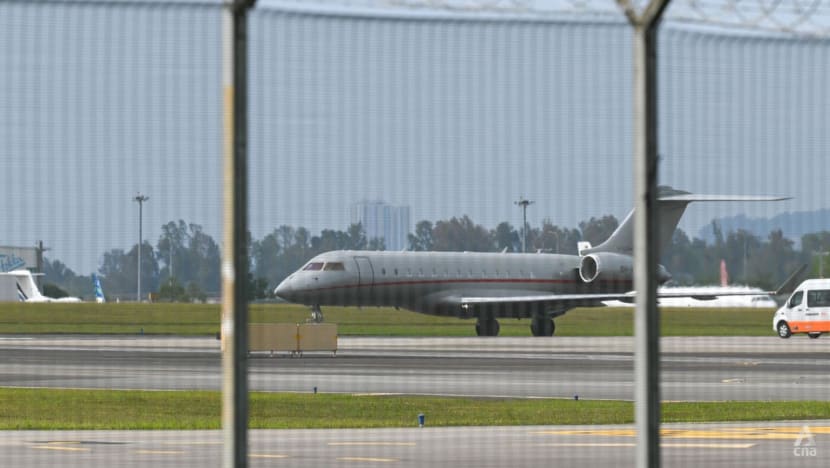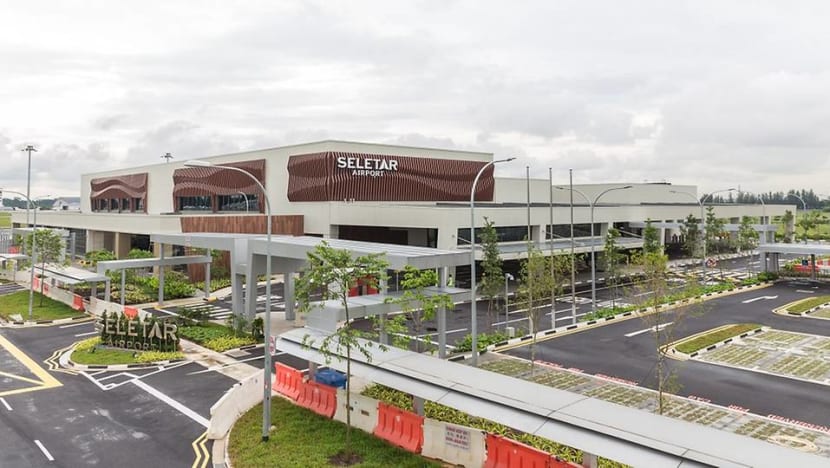Advertisement
The number of private planes based in Singapore grew from 66 at the end of 2022 to 74 at the end of 2023, according to a consultancy firm.

New: You can now listen to articles. 
This audio is generated by an AI tool.

17 Jan 2025 06:00AM
SINGAPORE: The private jet market in Singapore has taken off, outstripping levels seen before the COVID-19 pandemic, with industry insiders citing the country’s business hub status as a key driver of such growth.
Demand for private jet travel in Singapore, as measured by business jet departures from Changi and Seletar airports in total, is up about 30 per cent from pre-COVID levels, according to non-public data that New York-based Alton Aviation Consultancy shared with CNA.
The data compares figures from calendar year 2024 to that of 2019.
The number of private jets based in Singapore also rose from 66 at the end of 2022 to 74 at the end of 2023, according to most recently available data from consultancy firm Asian Sky Group.
In comparison, there were 45 jets based in Malaysia, 56 in Indonesia and 41 in Thailand at the end of 2023.
The consultancy considers an aircraft as based somewhere if its most active flying location is from that airport, said Asian Sky’s media and publications director Alud Davies.
While official figures for the number of takeoffs and landings for private jets in Singapore are not available, Mr Davies said his team constantly monitors aircraft entering and exiting the region.
“Our team of researchers have a good grasp of what aircraft are based where,” he said.
Private jets can either be owned by individuals or chartered out to clients by charter firms for business, medical or leisure purposes.
Five jet charter companies CNA spoke to also reported rising demand in Singapore. This has led to some of them expanding their fleets, though most of the firms acknowledged that flight movements tailed off slightly in 2024.
Air Charter Service’s Singapore office said the private market was “significantly bigger than pre-COVID”, with hefty growth over the past three years.
Its director for private jets Brendan Toomey said the firm did 35 per cent more flights in and out of Singapore in 2024 compared to 2021. There was also a “huge surge” in aircraft charters in 2022 and 2023 due to the post-COVID travel boom.
Mr Toomey added that the firm has made over 40 per cent more charter aircraft available compared to 2021, giving clients “a bit more choice now”.
For private jet management and charter firm TAG Aviation Asia, takeoffs and landings in Singapore soared more than 50 per cent from 2022 to 2023.
Similarly, private jet charter firm VistaJet saw flight traffic to and from Singapore grow by 31 per cent from 2022 to 2023, with flight hours increasing by 45 per cent.
Even more strikingly, the Amber Aviation firm recorded a 77 per cent surge in the number of flights arriving and departing from Singapore in 2023, compared to 2022.
In 2023, aircraft management firm Air 7 Asia bought a hangar at Seletar Airport to maintain its fleet of seven aircraft, up from just one four years ago.
The growing private jet activity in Singapore comes as the country is set to host its first ever Business Aviation Asia Forum and Expo in March at Changi Exhibition Centre, featuring a static display of private jets.
Business aviation refers to civil, non-commercial flights such as private jets used to transport individuals or groups for business purposes.
Mr Leck Chet Lam, managing director of event organiser Experia Events, said Singapore was the “perfect location” for the expo, with the growth of the business aviation sector in Asia-Pacific.
The region is the third-largest market for business aviation worldwide, trailing North America and Europe.
“We are right smack in the middle,” said Mr Leck. “You can use us as a platform to capture opportunities in a growing Asia-Pacific market.”
WHY IS SINGAPORE ATTRACTIVE?
Singapore is a leader in business aviation in Southeast Asia, as far as fleet size is concerned, said Mr Leck.
This is partly because of the industry’s growth in the region.
Mr Paul Desgrosseilliers, treasurer at the Hong Kong-based Asian Business Aviation Association, said investments into the industry have “really ramped up” in Southeast Asia over the past 10 years.
Singapore is in a prime position, both geographically and economically, to take advantage of it, he added.
“Singapore seems to be very well-situated, being in the centre of Southeast Asia, but also its infrastructure is well-developed … the economy is growing, expanding very rapidly,” he said.
Agreeing, Mr Leck said that with Singapore’s growing economy comes more business investment and hence more business travel.
“The very senior corporate leadership needs point-to-point travel that is quick, efficient and flexible; and at best with some privacy,” he said.
There are also practical reasons for Singapore being an attractive location to base a private jet.
Mr Leck said the country offers all the relevant amenities and facilities.
“Very important is the ecosystem in Singapore that supports business aviation, be it in maintenance, repair, overhauls … you have engineers, technicians readily available,” he said.
“When an aircraft lands, in terms of refuelling, hangarage, catering, immigration … it’s a one-stop-shop.”
Then there’s also Singapore’s appeal to ultra-high net worth individuals, defined as those with at least US$30 million of net worth.
A 2023 report by real estate consultancy Knight Frank forecast that the number of these well-heeled individuals based in Singapore would rise to 5,300 by 2027, up from 4,498 in 2022.
Air Charter Service’s Toomey said more of these wealthy individuals and families are choosing to be based in Singapore for its “tax advantages, good schools, low crime and political stability”.
“There is a good amount of wealth flowing into Singapore from other parts of the world and that brings with it both the potential for new clients, and also more aircraft for charter as the super wealthy bring their planes or purchase (them) to base in Singapore,” he said.

IS GROWTH SLOWING?
The pandemic’s effects on private jet travel cannot be discounted.
Mr Adam Cowburn, managing director at Alton Aviation Consultancy, said demand around the world was significantly stimulated by COVID-19.
This was “given the reduction in commercial aviation services, health concerns arising from the pandemic related to flying on a public conveyance, and the immediate post-COVID economic recovery which drove increased business activity and wealth creation”.
While it led to surges in the immediate years, demand has begun to taper off, as acknowledged by the charter firms in Singapore as well.
“2024 activity levels in Singapore are down approximately 8 per cent compared to the previous year’s levels,” said Mr Cowburn. “This mirrors the trend seen in many other large private aviation markets, where activity levels have retreated modestly from post-COVID highs.”
Agreeing, TAG Aviation Asia’s commercial director Simon Bambridge said an uptick in 2023 was likely due to post-pandemic “revenge travel”.
“Consequently, we have seen that demand moderate a little in 2024 as travel patterns normalise,” he said.
But insiders believe Singapore’s strong position in the market will continue.
Mr Cowburn expects growth both here and globally in the long term.
“(Private jet) activity levels have shown a robust correlation with overall economic activity, as well as the number and aggregate wealth of ultra-high net worth individuals,” he said.
The organiser of the Singapore Airshow is launching the Business Aviation Asia Forum and Expo in 2025. Leck Chet Lam, Managing Director at Experia Events, explains the rationale behind the timing of the show.
WHAT CHALLENGES REMAIN?
Notwithstanding Singapore’s attractiveness to jet charter firms, one private plane owner, who declined to have his name published, told CNA about his issues with basing his jet at Seletar airport here.
The owner said the airport was costly to operate from, with charges of S$1,100 (US$800) per aircraft departure for a private or business aircraft, even if carrying a few passengers.
Spokespersons from the Civil Aviation Authority of Singapore (CAAS) and Seletar Airport were reported in the Straits Times as saying that this minimum charge, introduced in 2024, would better reflect the use of facilities and services at the airport.
The private jet owner also said aircraft like his are subject to restrictive operating hours as well as restricted airspace, as its flight path is squeezed between military airspace.
“Aircraft are often delayed holding and burning fuel waiting for arrival clearance or on the ground waiting for departure,” he said.
According to the publicly available Aeronautical Information Publication by CAAS, which provides essential information for air navigation in Singapore, no flights are permitted between 10pm and 7am local time, except for emergency and medical evacuation flights.
This is to alleviate the problem of noise”, as there are residential areas around Seletar Airport, according to the publication.
In addition, private jet flights are generally not permitted at the airport from 9.30am to 10.30am, 12pm to 1pm, 3pm to 4pm, and 5pm to 6pm from Tuesdays to Sundays; to facilitate training flights.
Despite his grouses, the private jet owner also believes business aviation will thrive in Singapore.
“The size of the economy, affluence of the population plus an internationally-focused business community means that an increase in private and business aircraft is inevitable,” he said.
